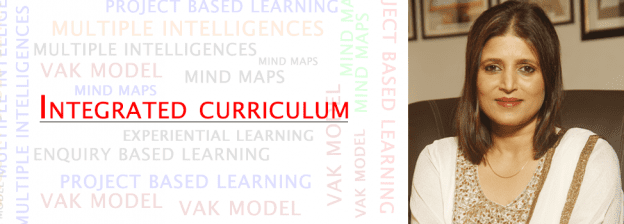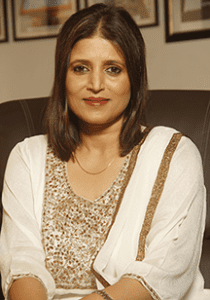![]()
The main focus of our educational programme is on the HOLISTIC DEVELOPMENT of the students, equipping them with the essential skills of the technically evolving 21st century. With this end in view, we have designed a unique curriculum that is based on the Principles of Integrated Learning and the Theory of Multiple Intelligences.
Our teaching methodology is an eclectic mix of cognitive and experiential and activity based learning strategies that cater to the three learning styles – VISUAL, AUDITORY and KINESTHETIC learners (VAK model). Our teaching modules are replete with Hands-on-learning activities, audio-visual aids, experimentations, investigations and research activities that form a part of the Enquiry-based and Project Based Learning Strategies.

The above diagram represents the structure of the curriculum and the intervening methodologies that define the teaching pedagogy at VIBGYOR HIGH
Experiential Learning
Experiential learning is any learning that supports students in applying their knowledge and conceptual understanding to real-world problems or situations where the instructor directs and facilitates learning. This is a holistic perspective that combines experience, perception, cognition and behavior. Experiential learning teaches students the competencies they need for real-world success.
Enquiry based Learning
Enquiry-based approach to teaching and learning is its potential to increase intellectual engagement and foster deep understanding through the development of a hands-on, minds-on and ‘research-based disposition’ towards teaching and learning. Inquiry honours the complex, interconnected nature of knowledge construction, striving to provide opportunities for both teachers and students to collaboratively build, test and reflect on their learning.
Project Based Learning
The core idea of project-based learning is that real-world problems capture students’ interest and provoke serious thinking as the students acquire and apply new knowledge in a problem-solving context.
Multiple Intelligences
Multiple Intelligence forms the core of the teaching process at VIBGYOR High as we endeavour to create learning opportunities to cultivate each intelligence. A unit of study is approached from different perspectives in order to draw out the latent abilities of the student in each of the domains: Linguistic, Mathematical, Musical, Visual-Spatial, Kinesthetic, Interpersonal, Intrapersonal and Naturalist.
Mind Maps
Mind Maps are based on the congnitivist approach to learning. This teaching methodology focuses on creating cognitive structures for learning that will facilitate understanding and easy recall. The use of mind maps train students to generate, visualize, structure, and classify ideas, and aids in studying and organizing information, solving problems and making decisions in their later years.
VAK Model
This model consists of creating different sensory experiences to aid Visual, Auditory and Kinesthetic learning. Through this model, the concept is internalized through activities that generate visual auditories and Kinestethic memories that form the basis for future learning.
At VIBGYOR High, we recognize the importance of making real world connections between the subject taught, and the students’ experiences, through these teaching methodologies that encourage the students to become reflexive and critical thinkers and active participants in a dynamically changing world.
Article by Ms. Kavita Sahay published in Career 360 magazine

